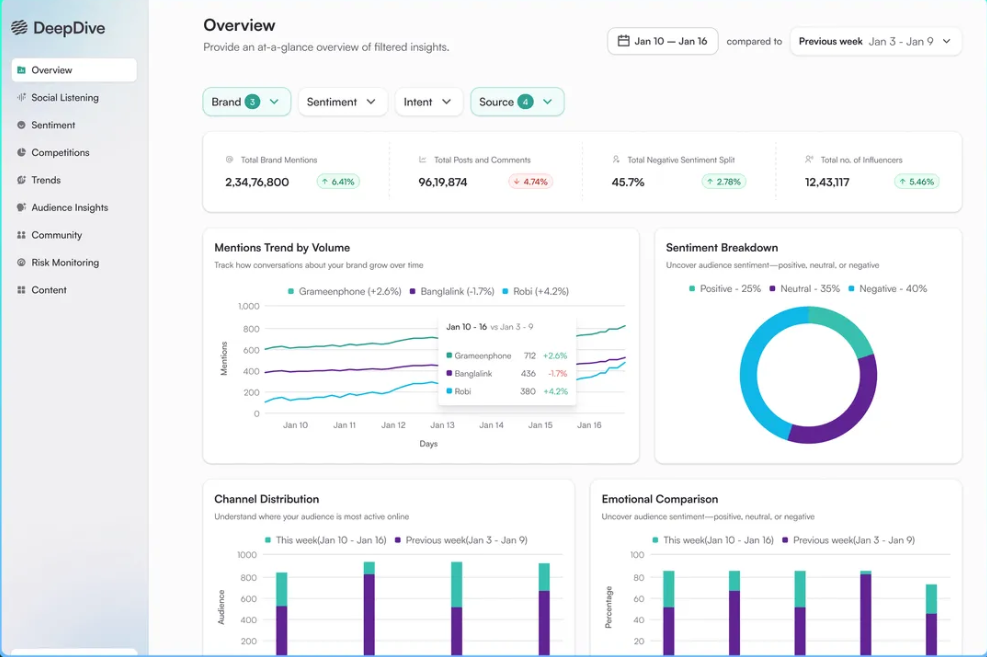We are excited to announce our $2M seed round led by Joa Capital.
Read Now
.png)
October 18, 2025
Fabiana Binte Mesbah
In 2025, the digital landscape is more turbulent, competitive, and data-rich than ever. Customers are scrolling, searching, and streaming at unprecedented rates, and businesses that can’t keep up with this pace risk being left behind. The difference between leaders and laggards comes down to one thing: digital analytics.
As businesses strive to stay ahead, digital analytics is the foundation for making smarter decisions, increasing ROI, and connecting with customers in meaningful ways. Let’s dive into what is digital analytics, why digital analytics is important for your business, and the best digital analytics tools for 2025.
At its core, digital analytics is the measurement, collection, and interpretation of data from digital touchpoints—your website, social media platforms, apps, ads, or even online conversations. It’s the bridge between what customers do and why they do it. It overlaps with digital data analytics and digital media analytics. This isn’t limited to tracking page views or clicks. With the rise of digital marketing analytics, businesses can understand sentiment, predict trends, and personalize interactions at scale.
You can think of it as the difference between staring at numbers and hearing your customer’s story. That’s where social listening tools like DeepDive come in: instead of just collecting data, they decode conversations, emotions, and patterns across the digital landscape.

Without analytics, you’re flying blind. From campaign performance to customer sentiment, data reveals what’s working and what’s wasting resources. It’s no wonder that over 90% of organizations report measurable value from analytics investments. Social listening tools sharpen this advantage by uncovering why conversations trend, not just when they do.
Today’s customers expect personalization across every touchpoint. In 2025, more than 5 billion people worldwide use the internet, leaving behind a flood of information that businesses can either ignore or transform into experiences that truly connect. Digital media analytics helps you find the moments that delight or frustrate customers, while predictive tools ensure you anticipate their needs before they ask.
With real-time dashboards, automation, and AI, businesses streamline decisions. Instead of sifting through noise, they focus on what matters most—saving time, reducing costs, and improving returns. In fact, 65% of business executives now cite predictive analytics as a core driver of growth. That means analytics isn’t just about hindsight; it’s a competitive edge for tomorrow.
Trends rise and die overnight. Analytics keeps you nimble. With tools like DeepDive and Brandwatch, businesses can detect sudden shifts in conversation, sentiment, or engagement, and adapt campaigns in hours instead of weeks.
Not all tools are built equal. The best digital analytics tools for 2025 combine:
Social listening platforms go beyond surface-level metrics. They pull conversations, sentiment, and cultural signals together, giving you the context behind the clicks. In a year when customer trust is currency, this context is priceless.
The future points to even deeper reliance on data. Analysts project the global data analytics market to reach US$132.9 billion by 2026, growing at over 30% annually. That growth will be driven by:
One thing is certain: the businesses winning in the next decade will be those that treat digital analytics as central, not peripheral.
Q: What is digital analytics versus digital marketing analytics?
A: Digital analytics covers all digital data—web, social, apps, media. Digital marketing analytics zooms in on campaign performance, attribution, and ROI.
Q2: Why digital analytics is important in 2025?
A: With the abundance of global data being produced every year and AI adoption skyrocketing, analytics is the only way to stay competitive, agile, and customer-focused.
Q3: What are digital analytics tools?
A: They’re platforms for collecting and interpreting digital data—ranging from Google Analytics to AI-powered social listening tools like DeepDive.
Q4: How does digital media analytics differ from other analytics?
A: It zeroes in on media content—ads, social posts, streaming—analyzing reach, engagement, and sentiment to measure influence and ROI.
Q5: What challenges come with digital analytics?
A: Data silos, privacy compliance, and choosing the right metrics. AI-driven, integrated tools help solve these challenges by providing context-rich insights.
Digital analytics isn’t a buzzword anymore—it’s the map, compass, and GPS for navigating 2025’s digital economy. From optimizing customer experiences to predicting trends, analytics keeps your business sharp and future-ready.
And with social listening tools like DeepDive, businesses don’t just count clicks—they hear conversations, sense shifts, and act with precision. In a world overflowing with data, that ability to listen and learn is the ultimate edge.
Discover How Audience Intelligence can help your brand grow